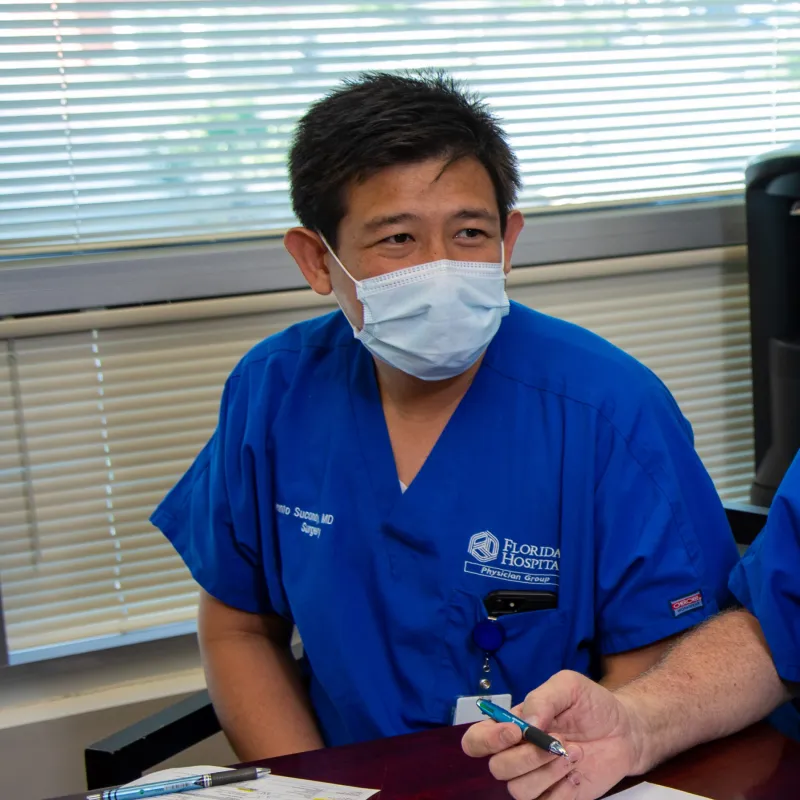
The Latest Medical and Surgical Treatments For Ulcerative Colitis
Ulcerative colitis is a form of inflammatory bowel disease (IBD) that causes ulcers and abscesses to develop in the lining of the large intestine. Although it can be diagnosed at any age, most patients are diagnosed before age 30.
Just like Crohn’s disease (another inflammatory bowel and autoimmune condition), ulcerative colitis flares up at times before going back into remission. However, ulcerative colitis differs from Crohn’s disease in that it only affects the large intestine (colon and rectum). Also, the area affected by ulcerative colitis is continuous instead of patchy, like with Crohn’s disease. In addition to causing bloody diarrhea and abdominal pain, ulcerative colitis increases a person’s chance of developing cancer in the affected area.
For these reasons, it's important to be cared for by an experienced team. At the AdventHealth Digestive Institute Tampa, our team of gastroenterologists and colorectal surgeons has a wealth of experience in treating ulcerative colitis. Our experienced surgeons offer minimally invasive procedures for ulcerative colitis that are easier on patients and preserve as much normal function as possible.
Ulcerative Colitis Symptoms
Symptoms of colitis can include:
- Diarrhea, often with blood
- Abdominal pain
- Rectal bleeding
- Anemia
- Dehydration
- Eye and skin problems
- Fatigue
- Fevers
- Joint pain
- Nausea
Diagnosis of Ulcerative Colitis
Because ulcerative colitis symptoms can be a lot like those of other gastrointestinal conditions, including Crohn’s disease, an accurate diagnosis is important. Depending on a patient’s medical history and exact symptoms, diagnosis is usually confirmed by endoscopy with the help of laboratory tests and imaging studies.
Lab tests used to screen for ulcerative colitis include:
- Complete blood count (CBC) test
- Tests that measure inflammation, including C-reactive protein screen (CRP) and sedimentation rate (ESR)
- Liver function test
- Stool tests
Imaging studies helpful in diagnosing ulcerative colitis include:
- Colonoscopy with biopsy
- Flexible sigmoidoscopy
- CT scan or MRI
- Capsule endoscopy
- Barium enema
Medical Treatment for Ulcerative Colitis
The goal of using medicine in treating ulcerative colitis is to manage flare-ups and prolong the times when the disease is in remission. Patients start treatment by taking anti-inflammatory medications and medicines that suppress the immune system. Dietary changes can help as well. While one’s diet does not cause inflammatory bowel disease, avoiding certain foods can help make IBD symptoms less severe.
These medicines and diet changes can help keep their symptoms mild to moderate, and some patients may even experience long periods of remission. For others, despite medical management, severe symptoms that do not go into remission persist. These patients may need surgery.
Surgical Treatment for Ulcerative Colitis
When ulcerative colitis symptoms are severe or chronic, surgery may be in order. The goal of surgery for ulcerative colitis is to help patients get back to a more normal lifestyle. AdventHealth Digestive Institute Tampa's colon and rectal surgeons have helped numerous patients with ulcerative colitis do just that.
Common surgical treatments for ulcerative colitis include:
- Colectomy – Removal of the colon
- Proctocolectomy – Removal of the colon and rectum
More details about these surgeries can be found on DHI’s Colorectal Surgery page.
J-Pouch Surgery Helps Restore Normal Function for Patients.
Removing the colon results in a need for an ostomy, or a new way for stool to exit the body. However, the colon and rectal surgeons at AdventHealth Digestive Institute Tampa are experienced in offering a way to do this that preserves normal function. The procedure is called an ileal pouch anal anastomosis, but it is better known as J-pouch surgery. The benefit of J-pouch surgery is that patients are not left with a permanent need for an abdominal opening and ostomy bag.
If you have ulcerative colitis or are experiencing symptoms of it and would like to be seen by a doctor at AdventHealth Digestive Institute Tampa, call for an appointment at Call813-615-7030.
Inflammatory Bowel Disease
-
Crohn's Disease
Learn more about the symptoms, diagnosis and treatment of Crohn's disease
-
Ulcerative Colitis
AdventHealth Digestive Institute Tampa gastroenterologists and colorectal surgeons focus on treatment for colitis and irritable bowel syndrome.
-
Surgical Treatment for IBD
If medicine no longer works for treating Crohn's disease or ulcerative colitis, surgery may be necessary.
-
Endoscopy Services for IBD
Our compassionate medical staff is committed to providing high-quality healthcare services in Hillsborough County.
-
Infusion Services
Sometimes medicine works better when it’s injected directly into the bloodstream, which is where infusion therapy comes in. Learn more about infusion services today.

Recover Faster With Minimally Invasive and Robotic Surgery
All the surgeons at the Digestive Health Institute (DHI) at AdventHealth Tampa have a large depth of experience in offering minimally invasive surgery.
Meet The Experts

Shreya Patel
MSN, FNP-C, ARNP
Nurse Practitioner

Surgical Consultations For Digestive Cancer Without The Wait
Appointments Within Five Days for Patients with Cancer
At AdventHealth Digestive Institute Tampa, we know that after being diagnosed with cancer, patients want and often need to begin treatment quickly. So we make it a priority to offer appointments for cancer surgery consultations within five business days, and often earlier.
Patients who are newly diagnosed with cancer, or have just found out they have cancer again, qualify for this priority access. Our surgeons will make themselves available to see you right away, even for a second opinion. We want to help you start your treatment as soon as possible.
If you have been diagnosed with a cancer of the digestive system, don’t wait.
Call the Digestive Health Institute at 813-615-7030.
News and Info

How to Respond When a Loved One is Hesitant About the COVID-19 Vaccine
Expert answers to some commonly asked questions and concerns about getting a coronavirus vaccine.

Digestive Institute Surgeon Gives Invited Talk, Multiple Presentations at International Laparoscopic Liver Society’s 3rd World Congress
To help promote minimally invasive surgery – which has many benefits for patients – and share their expertise, AdventHealth Digestive Institute Tampa (DI) surgeons such as Iswanto Sucandy, MD, FACS, advanced HPB (liver, pancreas and bile duct) surgeon, and Sharona Ross, MD, FACS, advanced HPB...

Pregnancy and the COVID-19 Vaccine
Considering starting a family soon? Read more about the COVID-19 vaccine and pregnancy from our experts.

